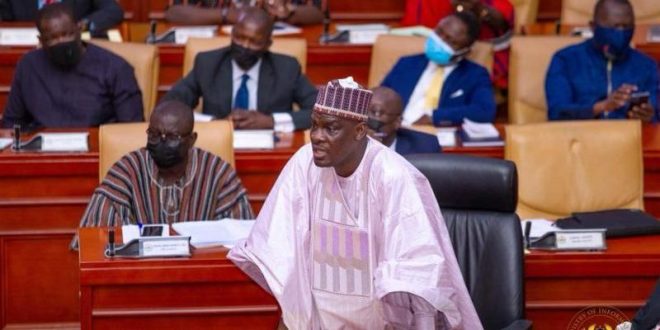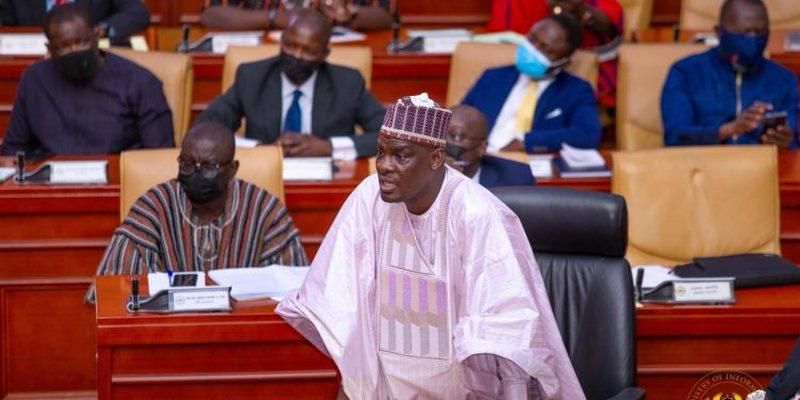
Introduction to Ghana’s New Foreign Language Course
In a significant development for the educational landscape in Ghana, Education Minister Haruna Iddrisu has announced plans to implement a compulsory foreign language course for second-year Senior High School (SHS) students by the end of this year. This initiative aims to enhance language skills among students, preparing them for a more interconnected global environment. The introduction of this course highlights the government’s commitment to improving educational standards and fostering communication skills among young learners.
Importance of Learning Foreign Languages
Learning foreign languages has become increasingly essential in today’s globalized world. Proficiency in multiple languages can open doors to various opportunities, both academically and professionally. It promotes cultural understanding, enhances cognitive abilities, and equips students with the necessary skills to thrive in diverse settings. By introducing a foreign language course in SHS, the Ghanaian government acknowledges the need for students to be competitive on both local and international stages.
Objectives of the Compulsory Foreign Language Course
The primary objective of this new initiative is to ensure that students are not only proficient in their native language but also capable of communicating effectively in at least one foreign language. The course is expected to focus on:
- Language Proficiency: Students will develop reading, writing, listening, and speaking skills in the selected foreign language.
- Cultural Awareness: The curriculum will likely include components that expose students to the culture and traditions associated with the language they are learning.
- Global Competence: By equipping students with foreign language skills, the program aims to enhance their ability to engage in a globally connected world.
- Career Readiness: Proficiency in foreign languages can significantly enhance employability, as many employers seek candidates with multilingual capabilities.
Implementation Timeline and Curriculum Development
As per Minister Iddrisu’s announcement, the compulsory foreign language course is expected to roll out by the end of the year. This timeline suggests that the Ministry of Education is already in the process of developing a comprehensive curriculum that will cater to the needs of SHS students. The curriculum will likely include various teaching methodologies, resources, and assessments to ensure effective learning outcomes.
- YOU MAY ALSO LIKE TO WATCH THIS TRENDING STORY ON YOUTUBE. Waverly Hills Hospital's Horror Story: The Most Haunted Room 502
Potential Languages Offered
While the specific foreign languages to be offered in the SHS curriculum have not been disclosed, popular choices often include:
- French: As one of the most widely spoken languages in Africa and a significant language in international diplomacy, French is a strong candidate for inclusion.
- Spanish: With its growing importance in global commerce and culture, Spanish is another language that could be beneficial for students.
- Chinese: Given China’s rising global influence, learning Mandarin could provide students with valuable opportunities in the future.
- German: As a key language within the European Union, German could also be considered for the curriculum.
Challenges and Considerations
While the introduction of a foreign language course is a progressive step, several challenges may arise during its implementation:
- Resource Allocation: Ensuring that schools have the necessary resources, including qualified teachers, textbooks, and technology, will be crucial for the success of the program.
- Curriculum Standardization: Developing a standardized curriculum that meets educational standards across different regions may pose a challenge.
- Student Engagement: Encouraging students to engage with a new language can be difficult, especially if they do not see the immediate relevance of learning it.
Benefits for Students and Society
The introduction of a compulsory foreign language course promises numerous benefits for both students and society as a whole:
- Enhanced Communication Skills: Students will be better equipped to communicate with people from diverse linguistic backgrounds, fostering inclusivity and understanding.
- Increased Opportunities: Proficiency in foreign languages can open up various academic and career opportunities, allowing students to pursue higher education and employment in international settings.
- Cultural Exchange: Learning a foreign language can promote cultural exchange and understanding, fostering a more harmonious society.
Conclusion
The announcement by Education Minister Haruna Iddrisu regarding the mandatory foreign language course for second-year SHS students marks a pivotal moment in Ghana’s educational reform. By prioritizing language education, the government is taking a proactive approach to equip the younger generation with essential skills for the future. As the world continues to become more interconnected, the ability to communicate across languages will be invaluable. This initiative not only aims to enhance individual student outcomes but also to contribute to a more globally aware and competent populace in Ghana.
Stay Updated
For those interested in following the developments of this initiative, stay tuned for further announcements from the Ministry of Education. The implementation of this foreign language course could lead to substantial changes in the educational landscape, fostering a generation of multilingual individuals ready to take on global challenges.

JUST IN
Education Minister, Haruna Iddrisu has revealed plans to introduce a compulsory foreign language course for second-year SHS students by the end of the year.
Stay tuned pic.twitter.com/1xsiue8znh
— 𝐕𝐎𝐊 𝐋𝐈𝐕𝐄 (@Thevokofficial) April 26, 2025
JUST IN
In an exciting development for education in Ghana, the Education Minister, Haruna Iddrisu, has announced plans to introduce a compulsory foreign language course for second-year Senior High School (SHS) students. Set to roll out by the end of the year, this initiative aims to equip students with essential foreign language skills, fostering better communication in an increasingly globalized world. This move has sparked conversations and debates among educators, parents, and students alike. Let’s dive deeper into what this means for the educational landscape in Ghana.
Understanding the Need for Foreign Language Education
As the world becomes more interconnected, speaking multiple languages is no longer just a nice-to-have; it’s becoming a necessity. In Ghana, where diverse cultures and languages coexist, introducing a foreign language in the curriculum presents a unique opportunity for students to enhance their linguistic abilities. Engaging with a foreign language can significantly improve cognitive skills, boost career prospects, and enhance cultural awareness. By implementing a compulsory foreign language course, the government is addressing this critical need.
The Vision Behind the Initiative
The vision behind introducing a foreign language course is multifaceted. Firstly, it aims to prepare students for the global job market, where employers increasingly value multilingual candidates. In a world where businesses are expanding their reach across borders, being able to communicate in different languages can set one apart from the competition. Secondly, it encourages cultural exchange and an understanding of global perspectives, which is vital in today’s multicultural environment. As noted in the announcement by [The VOK Live](https://twitter.com/Thevokofficial/status/1916207149023170860?ref_src=twsrc%5Etfw), this initiative has the potential to transform the educational experience of SHS students.
Potential Languages to be Offered
While the specific foreign languages to be included in the curriculum have yet to be confirmed, it’s likely that popular choices such as French, Spanish, and Mandarin will be considered. French, in particular, is widely spoken across West Africa and is often seen as a valuable asset in the job market. Spanish, being one of the most spoken languages globally, opens doors to various opportunities. Mandarin, on the other hand, reflects the growing economic influence of China and could be beneficial for students looking to engage in international business.
Impact on Students’ Learning Experience
Introducing a compulsory foreign language course can significantly enhance students’ overall learning experience. Learning a new language fosters critical thinking and problem-solving skills. It encourages students to approach challenges from different angles and appreciate diverse viewpoints. Furthermore, it can boost their confidence as they learn to express themselves in a new language. Engaging with foreign cultures through language can also lead to a more enriching educational journey, as students will be able to explore literature, films, and traditions from different countries.
Challenges Ahead
While the introduction of a foreign language course is a positive step, there are challenges that need to be addressed. One of the primary concerns is the availability of qualified teachers. Ensuring that educators are well-equipped to teach these languages is crucial for the program’s success. Additionally, there might be resistance from students who are already facing a packed curriculum. It’s essential for the Ministry of Education to collaborate with schools to integrate this new course seamlessly without overwhelming students.
What This Means for Teachers
For teachers, this initiative presents both opportunities and challenges. On one hand, it allows educators to diversify their teaching methods and engage with students in new ways. On the other hand, it requires professional development and training to ensure that teachers are equipped to teach foreign languages effectively. The government will need to invest in training programs that not only focus on language proficiency but also on innovative teaching strategies that make learning a new language fun and engaging.
Community and Parental Involvement
Community and parental involvement will play a significant role in the success of the foreign language program. Schools can organize workshops and information sessions for parents to understand the benefits of foreign language education. Encouraging parents to support their children’s learning at home can create a more conducive environment for language acquisition. Moreover, community programs that promote language learning and cultural exchange can further enrich the experience for students.
Looking Ahead: The Future of Language Learning in Ghana
The introduction of a compulsory foreign language course is just the beginning. It signals a shift towards a more inclusive and comprehensive education system that recognizes the importance of global citizenship. As students develop their language skills, they will be better equipped to navigate an increasingly interconnected world. Furthermore, this initiative could pave the way for additional educational reforms that prioritize language learning and cultural education in Ghana.
Conclusion: A Step Towards Global Competence
The announcement by Education Minister Haruna Iddrisu marks a significant milestone in Ghana’s educational journey. By introducing a compulsory foreign language course for second-year SHS students, the government is taking a proactive step towards equipping the next generation with the skills they need to thrive in a globalized world. As we await further details on the implementation of this program, it’s clear that the future of education in Ghana is moving towards inclusivity, diversity, and global competence.
“`
This article is designed to be engaging and informative, focusing on the importance of the upcoming foreign language course for SHS students in Ghana while strategically incorporating SEO elements. The headings and structure are optimized for readability and search engine visibility.
